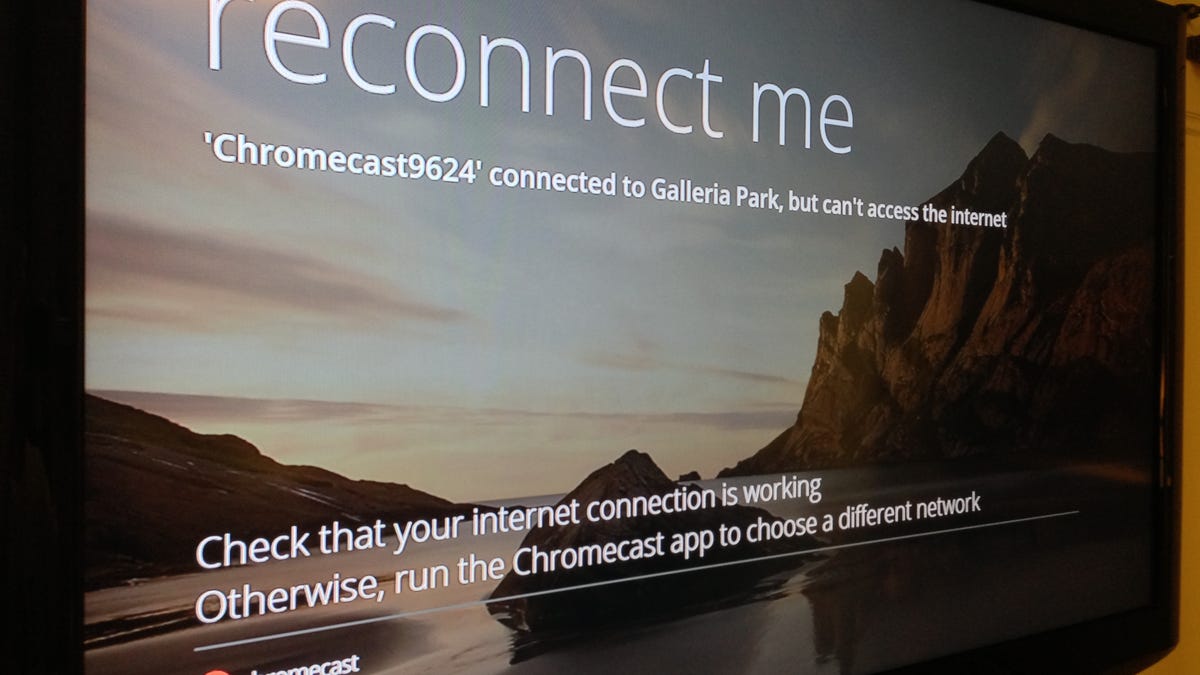How hotel Wi-Fi killed my Chromecast travel dreams
The $35 Chromecast seemed like the perfect alternative to expensive hotel pay-per-view. Unfortunately, the hotel's Wi-Fi didn't cooperate.

Last week, I visited San Francisco for a long-overdue trip to the CNET home office. In anticipation of the four-night stay, I added my new Chromecast to my luggage. (I managed to get in on the first wave of Amazon sales before it quickly sold out.) My thought: I could queue up some Netflix rather than watch the random 20 standard-def cable channels on the hotel TV feed.
It seemed like a perfect use of Google's new ultracompact streaming dongle. And lying on the bed and watching my own choice of Netflix programming on the TV across the room seemed far more preferable to watching it on the screen of a 13-inch laptop balanced precariously on my stomach.
Unfortunately, the idea was a no-go.
I was able to physically set up the Chromecast in about 30 seconds; it was dead-simple to plug the Chromecast dongle into a free HDMI port on my room's LG TV, and power it from the television's USB port. Switching to the right input was a snap, too.
But I hit a wall with wireless.
Two aspects of the hotel Wi-Fi kept the Chromecast from being my on-the-road entertainment solution. And both of them would've flummoxed competing devices like the Apple TV or Roku.
Problem 1: Wi-Fi log-in
I was staying at the Galleria Park in San Francisco, which offers complimentary Wi-Fi. In order to authenticate, however, the network splash screen asks for a room number (call it your "username") and a last name ("password").
In other words, the Wi-Fi network at the hotel is "open" in that you don't need a WPA or WEP password to log in. But without the proper credentials (network username and password), you can't get past the log-in screen.
That's fine for anything with a browser -- laptop, tablet, smartphone, even some e-readers, like the Kindle -- but it utterly fails for any "entertainment device" that doesn't have a browser. So my browser-enabled $69 Kindle worked fine, but the Chromecast didn't. (I didn't have an Apple TV or Roku on hand, but they wouldn't have worked, either.)
Indeed, the hotel's Wi-Fi was a lot like the security on my corporate network, which requires my company username and password. That's exactly why we have a separate CNET Labs network for testing entertainment devices that don't have browser-based log-ins. (Let's face it: no home network is going to have that layer of security.)
Problem 2: Wi-Fi speeds
Even if I'd been able to log in to the hotel's network, it wouldn't have been smooth sailing. The Galleria Park's free Wi-Fi was advertised as 1Mbps, and Speedtest on my laptop verified that was exactly the speed I was pulling down. That was perfectly fine for e-mail, Web surfing, and even some short inline videos, but for sustained video streaming at HD resolution, you really want upward of 3.5Mbps (if not much more).
4G hot spot: Not always an option
I know what you're thinking: both of these problems could be solved by using the hot-spot function on a 4G LTE phone (or a standalone hot-spot device). However, even if I was going to pay the premium for that service, I would've been out of luck on this trip: my phone was barely getting two bars on Verizon -- probably because my room was in the interior ring of the hotel. When I was making calls, folks on the other end of the line were complaining that I was dropping in and out -- so cellular-based data service just wasn't reliable in that particular location.
Is there room for hope?
One has to wonder if this situation will improve. After all, hotels no more want to provide you with a "free" alternative to their pricey in-room pay-per-view movies than they want you to know that there's a nearby drugstore with the same items as the minibar available at a fraction of the price.
That said, all is not lost. Wi-Fi is a key amenity, and touting faster, better wireless is certainly a big green light for travelers shopping in an increasingly competitive market.
On the Chromecast front, I think we could see progress as well. Because the Chromecast setup program uses a Mac, Windows PC, or Android device to "upload" a network Wi-Fi password to the unit, it certainly seems possible that Google could update the setup software to accept a username/password combo. That's just a guess, though; one suspects that's exactly the sort of workaround that could be exploited by clever hackers. (I can see the headline now: "Chromecast password exploit used to hack hotel network.")
But I'll hope for the best, and add a username-compatible log-in to our wish list of the several upgrades we're hoping for Google to add to the Chromecast.
In the meantime, it looks like a tablet remains your best bet for on-the-road entertainment.

